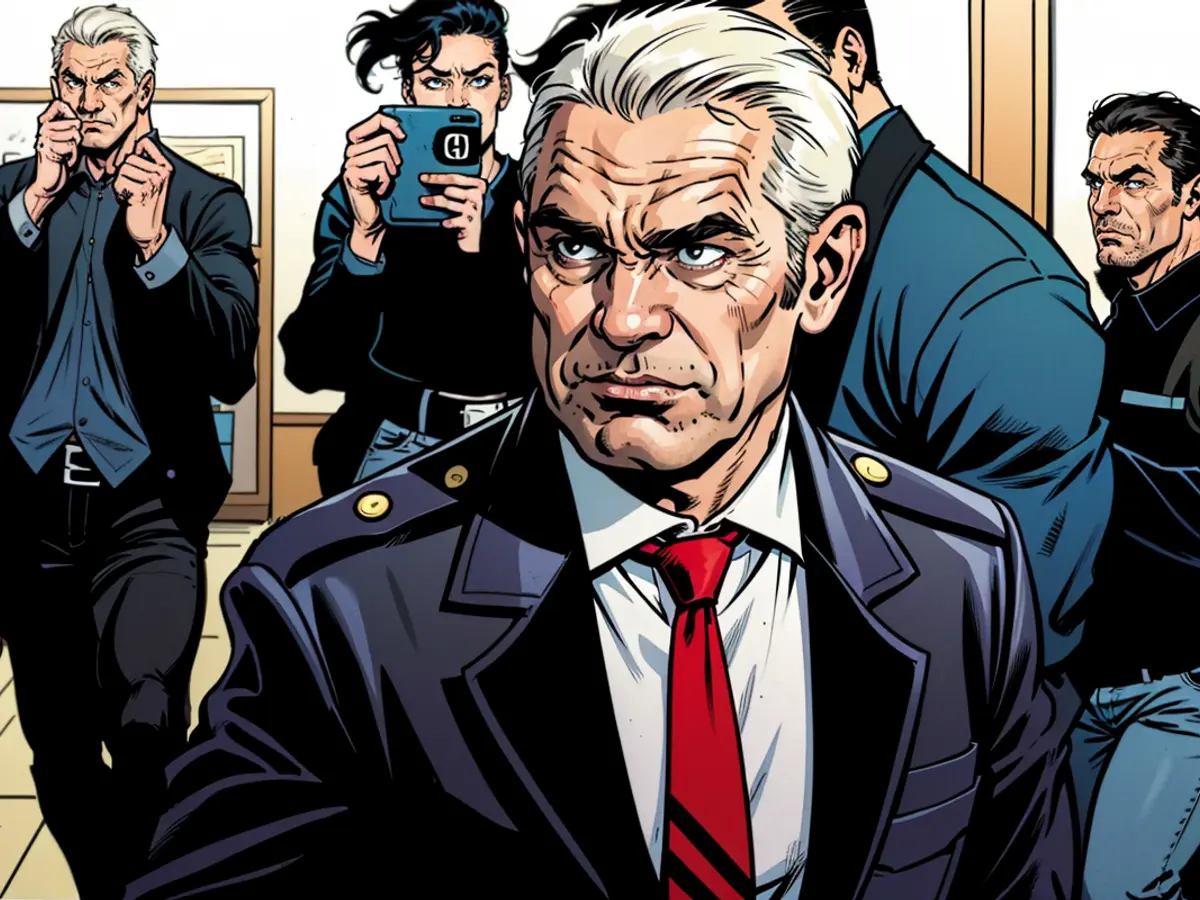Scholz rejects Putin's proposed terms for Ukraine summit: "Peace should not be imposed upon us"
Prior to the anticipated peace conference in Switzerland, scheduled for Saturday afternoon sans Russia's participation, Putin declared that his nation would instantly cease the hostilities and negotiate if Ukraine vacated the partially held territories of Donetsk, Luhansk, Kherson, and Zaporizhzhia, and renounced NATO affiliation.
German Chancellor Scholz commented on Putin's remarks on Saturday via ZDF-Nachrichtenportal heute.de, stating that his proposal was "ungenuine" and unrelated to the Switzerland conference. Scholz asserts that Putin is "propagating typical imperialist territorial expansion" and has unleashed an extreme amount of force, causing the death or injury of countless Russian soldiers.
Moscow's demands were rejected by Ukrainian advisor Mychailo Podoljak on Friday in an online post, stating that there was no new proposals, no genuine peace intentions, and no desire to end the conflict.
Ukrainian President Volodymyr Zelenskyy spoke to Sky TG24 on the margins of the G7 summit in Italy, describing Putin's actions as an "ultimatum" and drawing a parallel with Adolf Hitler's wartime tactics. Zelenskyy maintains that Putin's plan of annexing part of Ukraine is analogous to Hitler's demand of a portion of Czechoslovakia, asserting that such a call is false.
Scholz clarified that the conference in Switzerland is simply a first step towards peace. The main focal points now are the recovery of kidnapped children, grain export, and the safety of nuclear power plants. Scholz was en route to Switzerland following the G7 summit.
Scholz declared that the weekend's proceedings should lay the groundwork for subsequent conferences, intending to engage as many parties as possible to facilitate a successful outcome. "First, we need to sow seeds that will require watering," Scholz said, with the aim of cultivating a peace settlement that is just from Ukraine's perspective.
The G7 expressed their backing for Ukraine during their summit, where Zelenskyy was a guest. The aim is to assist Ukraine in its battle against Russia with a $50 billion (approximately €46 billion) credit, which should become available by year's end to counteract possible US aid reduction if Donald Trump were to be re-elected as US President.
Scholz deemed the $50 billion credit a "powerful reassurance" for Ukraine and asserted that it serves as a foundation for peace prospects because it sends a clear message to the Russian president that his advantageous position cannot be maintained if he persists.
Additionally, Ukraine, the United States, and Japan inked bilateral security agreements on the sidelines of the meeting. The agreement with the United States obliges Kiev to provide long-term assistance for a decade.
Upon his return to the USA following the G7 summit, Biden dispatched Vice-President Kamala Harris to attend the Swiss conference instead. Harris pledged $1.5 billion in US support for Ukraine, specifically earmarked for the energy sector and humanitarian aid. Harris is set to meet Zelenskyy in person upon her arrival at Burgasenstock, who has been present since Friday evening.
Zelenskyy had been campaigning for the meeting during recent visits to various global allies. China declined to send representatives, as Russia was not invited. Zelenskyy imputed Beijing's absence as an obstacle to participation.
Attendees of the conference at Burgasenstock, apart from EU leaders and officials, will include the presidents of Argentina, Colombia, and Chile. Saudi Arabia, India, and South Africa are dispatching delegates, with Brazil present as an observer. In total, about 90 delegations and roughly 50 heads of state and government were estimated to attend the conference, running through Sunday.
The luxury resort Burgasenstock, equally named, hosts the conference. Four thousand soldiers are on duty to maintain security, with more than 400 local residents requiring "red zone" permits.
Read also:
- Despite Russia's absence, the peace conference in Switzerland, scheduled for Saturday, aims to bring an end to the conflict in partially held territories like Donetsk and Luhansk in Ukraine.
- German Chancellor Olaf Scholz criticized Putin's proposal to cease hostilities if Ukraine vacates Ukrainian territories and renounces NATO affiliation, calling it "ungenuine" and unrelated to the Switzerland conference.
- At the G8 summit in Italy, leaders expressed their support for Ukraine and pledged a $50 billion credit to assist Ukraine in its battle against Russia.
- In response to Putin's demand for part of Ukraine, Ukrainian President Volodymyr Zelenskyy drew a parallel with Adolf Hitler's wartime tactics, stating that Putin's plan of annexing part of Ukraine was false and analogous to Hitler's demand of a portion of Czechoslovakia.5.odd Scholz clarified that the conference in Switzerland is only a first step towards peace, focusing on the recovery of kidnapped children, grain export, and the safety of nuclear power plants.
- In an online post, Ukrainian advisor Mychailo Podoljak rejected Moscow's demands, stating that there was no new proposals, no genuine peace intentions, and no desire to end the conflict.
- Putin's proposal for a "dictated peace" in Ukraine was met with criticism, as both Scholz and Zelenskyy emphasized that peace should not be imposed upon them.
- Scholz emphasized the importance of engaging as many parties as possible to facilitate a successful outcome, intending to lay the groundwork for subsequent conferences.
- During the G8 summit in Italy, Zelenskyy secured bilateral security agreements with the United States and Japan, committing to long-term assistance for a decade.
- Following the G7 summit, Vice-President Kamala Harris was dispatched to attend the Swiss conference in place of President Biden, pledging $1.5 billion in US support for Ukraine.
- The luxury resort Burgasenstock, located in Switzerland, will host the conference, with 4000 soldiers maintaining security and over 400 local residents requiring "red zone" permits.
- Apart from EU leaders and officials, the Ukraine conference will also include the presidents of Argentina, Colombia, and Chile, as well as delegates from Saudi Arabia, India, and South Africa.







